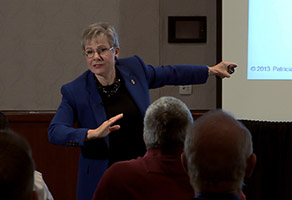
Selling isn’t about you or your products, it’s about how the prospect will benefit.
To be persuasive, you need to appeal to the other person’s rational self-interest. People make decisions for their reasons, not yours. Here are some quick reminders to help them make those decisions in your favor.
Forget your company history or industry jargon, which might be the biggest “who cares?” of all. You have heard the expression, “A confused mind always says no.” Here is a Frippicism: “A bored mind gets distracted and cuts your meeting short.”
Use a phrase like, “Based on 15 years of helping clients of your size business, I have learned…” or “With the last five clients in your industry, I have found…” and you can work that information into your presentation without belaboring the point.
Simplify and clarify how your prospects can benefit from your product or service. At the beginning of the relationship, when you are discovering if they have a need, or how much opportunity is there for you to help, they need to do most of the talking.
Take notes on what they say. When appropriate, feedback their words in your conversation and then in your proposal. Our prospects never disagree with themselves!
The key to connection is a conversation, and the secret of conversation is to ask questions. The quality of the information you receive depends on the quality of your questions.
In your presentations, even if you know your discovery questions backwards and forwards, write them down. If you are part of a team, collaborate with your teammates and add to your list, since it’s easier to be creative with a couple of minds working on the challenge.
Depending on what you are selling, it may be a good idea to start asking a prospect what is working. This way you are getting your prospect talking, learning more, and putting them in a good mo od.
od.
Above all, keep your sales questioning conversational—it’s not an interrogation. Whenever possible, answer the prospect in a way that brings in your past experience with other clients like them, but keep the focus on getting the information to understand how they can benefit from a relationship with you.
Now that we’ve discussed the importance of questions, what exactly should you ask? I discuss that in my follow up to this post, “How to Make A Sale by Making Your Questions Count.”
![]() If you and your sales team are losing out because of poor presentation skills, why not get the help you need on your own schedule? Become a great speaker easily, conveniently, and quickly with Fripp Virtual Training.
If you and your sales team are losing out because of poor presentation skills, why not get the help you need on your own schedule? Become a great speaker easily, conveniently, and quickly with Fripp Virtual Training.
For 20 years I have hired Patricia Fripp to train and coach sales teams with amazing success. FrippVT, in combination with in-person training and coaching, is an unbeatable combination.
– Greg Stivers, Senior Vice President, Client Development, Concur
Try FrippVT today!
Executive Speech Coach and Hall of Fame Keynote Speaker Patricia Fripp works with those who realize that powerful, persuasive presentation skills give them a competitive edge.
